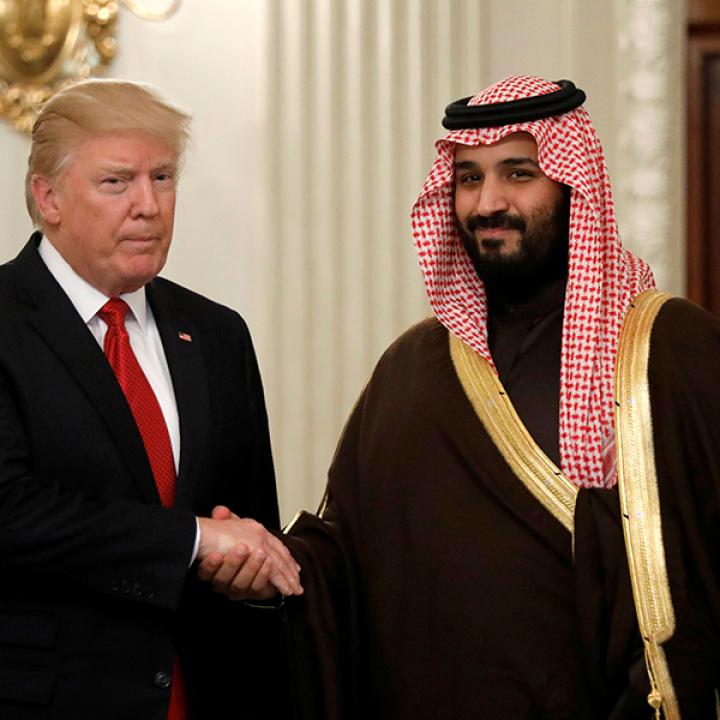
- Policy Analysis
- Articles & Op-Eds
Trump Can Set Big Things in Motion on His Mideast Trip

The upcoming regional tour is an opportunity to begin correcting Washington's flawed foreign policy.
President Trump's journey to Riyadh and Jerusalem, launching his first foreign trip, is designed to show both Middle Easterners and the wider world that the Barack Obama era in foreign policy is a thing of the past. Obama, one should recall, also made the Middle East one of his earliest overseas stops. But his itinerary skipped Israel, setting an arm's-length tone for relations with our closest regional ally that was a consistent theme of his administration. (Israel contributed its share to this process, too.) And in Cairo, Obama decided to speak over the heads of the Egyptian leadership and, in his landmark "New Beginning" speech, addressed himself instead to the broader Muslim world, not even mentioning the hospitality and friendship of longtime ally Hosni Mubarak.
Trump, by contrast, is at ease talking mano-a-mano with other leaders -- democratic or not -- and the Saudis are obliging by arranging a massive gathering of Arab and Muslim potentates that ranges from the king of Morocco to the president of Indonesia. If Obama wanted to speak to the billion-plus Muslims of the world, Trump will speak to their leaders, which is almost certainly his preference. And the photo of the President surrounded by so many Muslim leaders is likely to be Exhibit A when administration lawyers next go to court to refute charges that the temporary travel ban is based on anti-Muslim bigotry.
By visiting Israel on his first overseas trip, Trump is also sending a powerful message about the importance he attaches to partnership with Jerusalem. Of course, presidential tourism is not the only way to underscore a strategic commitment; Ronald Reagan, as firm a Zionist as ever served in the White House, had two terms in office but never visited Israel. But the balance is striking -- a visit to the guardian of Islam's holiest shrines, followed by an overnight stop in the world's only Jewish state.
As important as these images may be, I hope the President does not limit himself to symbolism. In Saudi Arabia, Israel and his subsequent participation in a NATO summit in Brussels, the President has a rare opportunity to steer the U.S.-led coalition of stability-seeking nations in a direction that advances our common interests. Here are three specific suggestions:
First, the President should take advantage of his meeting with Muslim leaders in Riyadh to propose a new partnership to roll back the twin forms of Islamist extremism that threaten global peace and security -- the Sunni jihadism of ISIS, Al Qaeda and like-minded sub-state actors, movements and groups and the Iranian-led consortium of radical states, militias and proxies.
Such a partnership -- less than a full-fledged treaty but more than just a vague communique -- would have many component parts, from military, political and diplomatic to economic, educational and cultural. It would extend both a promise of tolerance and protection to Christians in Muslim lands as well as a full-throated offer of acceptance and cooperation to Israel. And it would formally signal the end of Obama's misguided effort to accommodate Iranian strategic ambitions at the expense of America's traditional partners in the broader Middle East.
Second, the President should link his Riyadh and Brussels meetings to secure promises from his Arab hosts and his NATO partners for a coordinated, all-hands-on-deck effort to ensure stability, security and reasonably effective governance in the lands soon to be liberated from ISIS domination in eastern Syria and western Iraq. From heinous terrorism to massive refugee flows, countries around the world suffered grievously when ISIS rose from the ashes of an earlier generation of Sunni jihadists that was defeated in Iraq but not extinguished; they all have a stake in preventing that from happening again. We will soon get another chance to do this right but it will only happen if Washington takes the lead in orchestrating practical commitments of financial, human and other forms of support.
And third, the President should use his considerable political leverage to advance a secure peace between Israel and the Palestinians. Ironically, the easiest part of this would be to re-launch direct negotiations, which the two sides managed to hold for only two weeks during the eight years of the Obama administration. Both Palestinian leader Mahmoud Abbas and Israeli prime minister Benjamin Netanyahu want the political relevance and diplomatic approval that come with engaging in peace talks and are likely to silence domestic critics in order to achieve those gains.
But to make real progress, Trump needs to augment his unique "art of the deal" expertise in three ways:
He should work to bring in the process powerful regional actors, like Saudi Arabia and Egypt, so they can sharpen the choices and opportunities facing the parties.
With Palestinians, he should pick up a theme George W. Bush championed 15 years ago as a requirement of U.S. partnership and then dropped in the tumult of the Gulf War -- an insistence on internal reform, on everything from fighting corruption to stamping out incitement to ending the odious practice of paying terrorists and their families.
And to underscore the path of hard decisions that await real peacemakers, Trump should also firm up understandings on settlement activity with Israel, so there is a visible commitment to limit construction to land inside the security barrier, not deep in the heart of what is likely to be Palestinian-ruled territory.
Countering jihadism. Pushing back on Iran. Preventing ISIS' resurrection after its coming defeat in Iraq and Syria. Injecting real content into a renewed push for Mideast peace. Securing Israel's rightful place in the region. That is a big agenda. You could even call it "huge." And even with all the distractions and missteps on the domestic front, it's doable, too.
Robert Satloff is executive director of The Washington Institute.
New York Daily News



